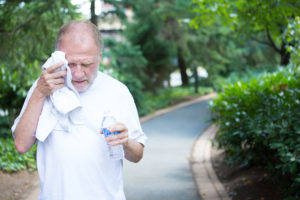 Summer is officially upon us. It’s the time of year for enjoying as much leisure time as possible outside. Whether you choose to indulge in barbecues, the beach, or tending your garden, the truth is that the majority of our summertime activities include plenty of sunshine. For seniors, it’s important to be aware of heat danger.
Summer is officially upon us. It’s the time of year for enjoying as much leisure time as possible outside. Whether you choose to indulge in barbecues, the beach, or tending your garden, the truth is that the majority of our summertime activities include plenty of sunshine. For seniors, it’s important to be aware of heat danger.
As much fun as spending these summer days outdoors can be, there are many dangers that can be associated with these extremely hot weeks, especially for the elderly. Heat is the leading cause of weather-related deaths, and according to the United States Environmental Protection Agency, seniors age 60 and over are at the highest risk for death by heat-related illnesses, and summertime temperatures only increase this liability.
Seniors and Heat Danger
“No one should die from a heat wave, but every year on average, extreme heat causes 658 deaths in the United States—more than tornadoes, hurricanes, floods, and lightning combined,” said Robin Ikeda, MD, MPH, acting director of the National Center for Environmental Health and Agency for Toxic Substances and Disease Registry.
Heat related illnesses are most often divided into either heat exhaustion or heatstroke. Heat exhaustion is a milder form of heat stroke, but can still cause severe illness. According to James L. Glazer, M.D. at the Maine Medical Center, heatstroke is caused by being exposed to outside elements, usually results in a core temperature above 104 degrees Fahrenheit, and primarily occurs in the elderly and those with chronic illnesses.
There are a variety of reasons why seniors are in greater danger for experiencing heatstroke. Older individuals lose their ability to sweat as effectively, and in addition their circulation decreases, therefore making their bodies less capable of cooling down in extreme heat conditions. According to the US National Library of Medicine, age-related changes in thermoregulatory and cardiovascular function decrease our body’s ability to maintain a safe core temperature.
These experts also suggest that seniors are less sensitive to exposure of extreme heat and take more time to feel uncomfortable and respond to these changes in climate than younger folks. The elderly may also have a decreased ability to detect dehydration. In addition, the use of multiple medications can make them more susceptible to heat stroke, as can preexisting and chronic health conditions.
Heat Stroke: Know the Signs
It is important to know and be able to recognize the symptoms of heat dangers like heat stroke in seniors, so that you can act quickly if you or a loved one is in immediate peril. Symptoms include dizziness, extreme body temperature, red and dry skin, an absence of sweat, strong pulse, fainting, nausea, headache, and confusion. If left untreated, heatstroke can result in permanent immobility or death, so it is crucial to recognize the signs and what to look for.
If you or a loved one is experiencing possible heat exhaustion or heat stroke, they should be immediately relocated to a cool environment and provided water. Cool, wet towels and ice packs can be used to help lower body temperature, as well as a fan or cold shower. 911 should be contacted immediately.
There are many precautions that can be taken to prevent heat stroke:
- Number one is hydration. Drink plenty of fluids, especially if you are working or exercising outdoors.
- Take breaks to come indoors, drink water and cool down.
- Wear loose, lightweight clothing that allows your skin to breathe.
- Apply sunscreen generously, and be sure to reapply every two hours.
- Condition yourself to warmer temperatures and allow your body to acclimate by easing into outdoor work or activities, and gradually increasing the time spent participating.
- Try to schedule intense outdoor activities such as working out or playing sports during the cooler parts of the day, such as the early morning or evening hours.
By educating yourself and taking a few simple precautions, you can combat heat stroke while still being able to enjoy the great outdoors this summer. Remember to take breaks in cool, ventilated areas, and to stay hydrated. Spending a little extra time caring for yourself can ensure you get to spend the most time possible enjoying this beautiful season with your loved ones, happy and healthy. Your safety is important to our team at Eldercare Services.
Click here for our handy info sheet about the signs and symptoms of heat-related illness, and what measures to take for treatment. Keeping this important information visible on your refrigerator or near your calendar during these hot summer months can serve as a great reminder and help keep you and your loved ones safe and in good health.





